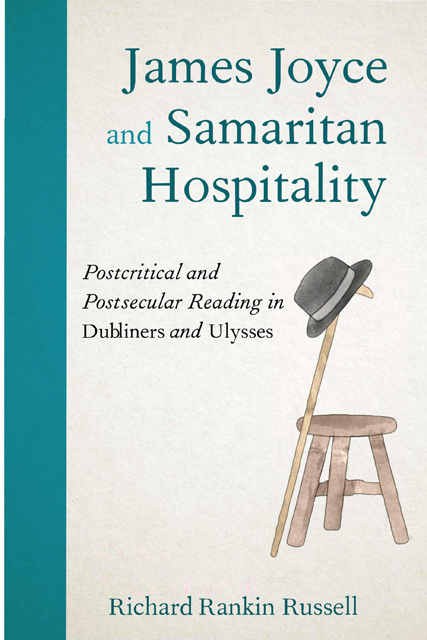Book contents
- Frontmatter
- Contents
- Preface and Acknowledgments
- List of Abbreviations
- Introduction
- 1 Haunted by Hospitality in “The Dead”
- 2 Joyce, Scripture, and Autobiographical Rescue Narratives
- 3 Rewriting the Good Samaritan Parable: The Fictional Rescue Narratives of “Grace” and “Circe”
- 4 Bloom as Stranger and Samaritan in “Cyclops,” “Oxen of the Sun,” and “Circe”
- 5 “In orthodox Samaritan fashion”: The Parabolic Encounter between Stephen and Bloom in “Eumaeus”
- 6 Home to “Ithaca” and “Penelope”: Bloom’s Hospitality and Stephen and Molly’s Reactions
- 7 Enfleshed Ethics and the Responsibility of the Reader in the Good Samaritan Parable and the “Nostos” of Ulysses
- Coda: “Go thou and do likewise”: Postcritical and Postsecular Reading through a Joycean Hermeneutics of Hospitality
- Works Cited
- Index
Coda: “Go thou and do likewise”: Postcritical and Postsecular Reading through a Joycean Hermeneutics of Hospitality
Published online by Cambridge University Press: 25 April 2023
- Frontmatter
- Contents
- Preface and Acknowledgments
- List of Abbreviations
- Introduction
- 1 Haunted by Hospitality in “The Dead”
- 2 Joyce, Scripture, and Autobiographical Rescue Narratives
- 3 Rewriting the Good Samaritan Parable: The Fictional Rescue Narratives of “Grace” and “Circe”
- 4 Bloom as Stranger and Samaritan in “Cyclops,” “Oxen of the Sun,” and “Circe”
- 5 “In orthodox Samaritan fashion”: The Parabolic Encounter between Stephen and Bloom in “Eumaeus”
- 6 Home to “Ithaca” and “Penelope”: Bloom’s Hospitality and Stephen and Molly’s Reactions
- 7 Enfleshed Ethics and the Responsibility of the Reader in the Good Samaritan Parable and the “Nostos” of Ulysses
- Coda: “Go thou and do likewise”: Postcritical and Postsecular Reading through a Joycean Hermeneutics of Hospitality
- Works Cited
- Index
Summary
[T]here’s a devotional quality in agreeing to be worked on by a text, a level of attunement and a willingness to yield that might be like worship.
Tracy Fassenden, “A Hermeneutics of Resilience and Repair,” 172[B]oth religious and secular redress need novels to help envision other worlds, to fancy themselves carried farther than they are able to go on their own.
Kevin Seidel, “Beyond the Religious and the Secular in the History of the Novel,” 646Future Avenues for Joyce and Hospitality Studies
While there are many aspects of hospitality to explore in Joyce these lie beyond the scope of this book, but they would prove fruitful for future research endeavors. Hospitality was an abiding concern of Joyce, and aside from his interest in scriptural explorations of it, there are many other avenues of hospitality to consider.
One of these would be Joyce’s receptive and hospitable attitude toward language and translation. Deeply interested in languages from an early age, Joyce became proficient in both Italian and French, and he also knew Latin (especially the Latin of the Vulgate translation of the Bible) and some Irish in addition to English. Having lived on the continent, and having immersed himself in its languages and cultures, and having delivered a series of lectures in Italian, Joyce’s career proves his openness not only to language but also translation. His works themselves, particularly Ulysses and Finnegans Wake, can be profitably read as translations into English of the Dublin idiom Joyce knew well, leavened with snatches of other languages, at times becoming a new language for which we as yet have no name.
Hospitality might be considered as part of another dimension of Joyce’s aesthetic and creative process: his interest in other writers and literary traditions beyond his own could be profitably explored. By opening himself up to a series of non-Irish writers such as Ibsen, Defoe, Calvino, and Dante, among others, Joyce showed a remarkable receptiveness to authors whose literary agendas differed from his own; yet he learned a great deal from them even if he rejected some of their particular stylistic or thematic approaches or ideologies.
- Type
- Chapter
- Information
- James Joyce and Samaritan HospitalityPostcritical and Postsecular Reading in Dubliners and Ulysses, pp. 198 - 211Publisher: Edinburgh University PressPrint publication year: 2023



